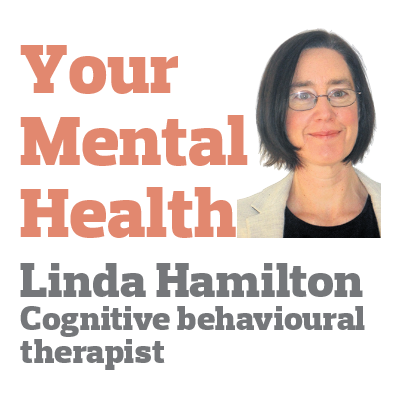
It’s easy to be your own worst enemy. To illustrate this point, consider the following examples.
Mike believes others will judge him negatively in social situations. Accordingly, he becomes very anxious when he has to attend social gatherings. His anxiety causes him to speak very little, avoid eye contact, and appear distant, which leads others to perceive him as uninterested or unfriendly. This reaction from others reinforces Mike’s belief that people don’t like him or think poorly of him, making him even more anxious in future social situations and leading him to avoid them whenever possible. Consequently, his social anxiety worsens, and he becomes increasingly isolated.
Mary experiences panic attacks. Although harmless, she worries she is at risk of having a heart attack. Due to her fears, she avoids crowded places, driving alone, exercising, and any activity that raises her heart rate. These avoidant behaviours maintain her belief that she is at risk of having a heart attack and intensify her fear of these kinds of situations. Consequently, her life becomes increasingly limited and restricted.
Samantha has low self-esteem. She depends heavily on her sister to handle most social interactions and make decisions for her. This reliance makes Samantha feel even more helpless and reinforces her belief that she is incapable of managing her own life. Consequently, she rarely experiences the satisfaction of accomplishing things on her own, which further weakens her confidence and independence.
Daniel sees himself as unlovable. He often cancels plans with friends and isolates himself at home. This behaviour reduces his opportunities for positive interactions, deepening his sense of loneliness and reinforcing his belief that no one truly cares about him.
Monica turns to alcohol whenever she feels stressed, lonely, or overwhelmed. This behaviour reinforces her belief that drinking is the only way she can cope with her emotions, leading her to increasingly depend on alcohol for relief. Over time, this reliance exposes her to more harmful and risky situations, further entrenching her dependency and making it harder for her to break free from the cycle.
Self-fulfilling
Can you see the common pattern? The different people may have different problems, but they are all behaving in ways that bring about a self-fulfilling prophecy.
They act based on their fears, beliefs, or insecurities, which then shape their experiences in a way that confirms their initial negative assumptions. This cycle can be difficult to break because it feels like the evidence is constantly validating their fears, when in reality, it is their behaviour that is creating the very outcomes they dread.
Understanding this pattern is crucial for anyone dealing with similar challenges. The first step in breaking the negative cycle is recognising that your actions are influenced by your thoughts and beliefs, and those actions are, in turn, shaping your reality. Once you see this connection, you can start to change the behaviours that reinforce your negative beliefs.
For example, Mike could challenge his belief that others will judge him negatively by gradually exposing himself to social situations. During these social situations, he could aim to cut out counter-productive safety behaviours (avoiding eye contact, speaking very little, and so on) and focusing on small, positive interactions. Over time, these positive experiences can help him build confidence and reduce his social anxiety.
Similarly, Mary could work with a therapist to gradually reintroduce activities she has been avoiding, learning to manage her anxiety and recognise that her fears of having a heart attack are unfounded.
For Samantha, building self-esteem and independence might involve taking steps to handle social interactions or decision-making on her own, even if it feels uncomfortable at first. Each success, no matter how small, can help her gain confidence in her abilities and reduce her dependence on others.
Daniel might benefit from pushing himself to engage in social activities, even when he doesn’t feel like it, to counteract his feelings of isolation and unworthiness. By actively seeking out positive interactions, he can begin to challenge his belief that no one cares about him.
Monica’s journey might involve finding healthier ways to cope with stress and emotional distress, engaging in activities that bring her joy and fulfilment without relying on alcohol.
In all these cases, the key to change lies in breaking the negative cycle by altering the behaviours that perpetuate them. Look at your behaviour and ask yourself a simple question: is this behaviour helpful or unhelpful?
The answer might be the first step toward changing your life.









